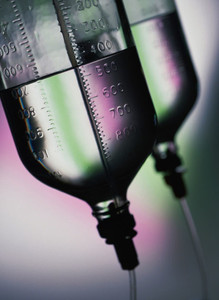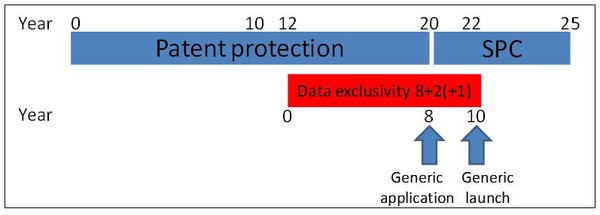Types of protection on the originator molecule that have to be taken into account by generic drug manufacturers when filing applications for generic drugs in the EU include the following:
- patents at the time of marketing
- supplementary protection certificates at the time of marketing
- data/regulatory exclusivity at the time of regulatory submission
- market exclusivity at the time of marketing.
Patents
Patents in the EU last for 20 years. Pharmaceutical products are normally covered by a number of patents, sometimes by as many as 30 to 40 patents or more. For pharmaceuticals these patents can be extended with a maximum of five years via a supplementary protection certificate.
Evergreening
A patent on a new use or ‘indication’, formulation, salt or ester can block the registration or marketing of a generic medicine for treatments where the original patent has already expired. This strategy is known as ‘evergreening’ aims to prevent or delay competition from generic medicines by extending market protection through patents on minor changes to the original product.
Data exclusivity
Data exclusivity is a separate and additional provision to patent protection for the originator medicine. With data exclusivity, there can be neither disclosure of regulatory data to a competitor nor regulatory reliance upon the data. Data exclusivity is the period during which no generic drug application can take place.
Therefore, generic medicines can only be evaluated and approved by the medicines regulatory authorities after the data exclusivity period has expired.
In the EU there is now an 8+2(+1) formula for data and marketing exclusivity, which means that originator's data is protected for 8 years and they have marketing exclusivity for a maximum of 11 years from first marketing approval in the EU.
Exclusivity period: 8+2(+1)
The 8+2(+1) exclusivity period came into effect in the EU in late 2005.
8 years data exclusivity dating from the European Commission authorisation decision: before that, no generic applications may be filed.
+2 years marketing protection: no generic applications may be approved.
+1 year: new indication(s) if it constitutes a significant clinical benefit.
It applies for all products, regardless of whether they followed a centralised or national approval procedure.
It is not retroactive; it does not affect exclusivity periods for products for which applications were submitted before the effective date—late 2005.
Market exclusivity
With marketing exclusivity, the agency cannot allow a competing product to enter the market during the time period in which an innovator has a right of exclusivity.
Submission of generic applications is only possible after the expiry of the data exclusivity at year 8. However, there is no linkage of patent protection with registration. Approval of the application and launch of the generic can then take place at year 10 if there is no patent protection, and if there is no additional 1 year of marketing exclusivity due to a significant new indication registered for the reference product during the first 8 years of license, see figure below.
Related articles
A sustainable generics industry in the EU
The role of generic drugs in the EU
Registration procedures for generic drugs in the EU
Quality control for generic drugs
Generic drugs – registration, quality, value and sustainability








 0
0












Post your comment